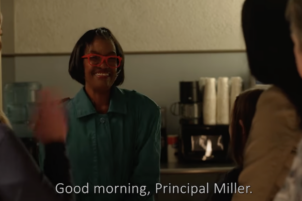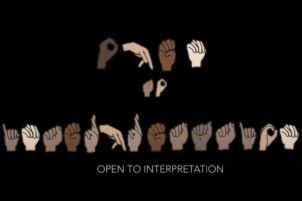
Meryl Streep delivering her Golden Globes acceptance speech
Washington, Jan. 9 – RespectAbility, a national nonprofit organization fighting stigmas and expanding opportunities for people with disabilities, thanks Golden Globe lifetime achievement award-winner Meryl Streep for talking about the importance of not making fun of people with disabilities.
“Disrespect invites disrespect; violence incites violence,” the winner of the Cecil B. DeMille Award said during her acceptance speech. “And when the powerful use their position to bully others, we all lose.”
President-elect Donald Trump fired back via Twitter, calling Streep “over-rated” and “Hillary flunky who lost big.”
RespectAbility, while grateful to Streep for “talking the talk,” challenges her to “walk the walk.”
“Now I hope that Meryl Steep will use her power and influence to ensure that television and movies include people with disabilities with accurate and positive portrayals,” RespectAbility’s President Jennifer Laszlo Mizrahi said. “Think about it – according to the U.S. Census, almost 1-in-5 of us has a disability. Yet according to GLAAD, fewer than two percent of scripted television characters have disabilities. For all the hundreds of shows on television, we are talking just 15 characters!”
In addition to the lack of representation in general, what does exist is misleading. Almost all portrayals of people with disabilities in media are white, despite the fact that disability impacts all ethnicities. According to a recent report by The Media, Diversity, & Social Change (MDSC) Initiative at USC’s Annenberg School for Communication and Journalism, only 2.4 percent of all speaking or named characters in film were shown to have a disability in 2015 and none of the leading character were from underrepresented racial or ethnic groups.
“Depictions of disability are not only marginalized,” the report says, “they also obscure the true diversity of this community.”
After all, disability is the one thing that does not discriminate. It can impact anyone due to accident, aging or illness at any time.
Furthermore, most characters with disabilities in film and television are shown in a negative, inaccurate light. For example, the Jerry Lewis Telethon used people with disabilities as objects of pity for five decades and more recently the film Me Before You glorified assistive suicide as the best solution for someone who acquires a disability.
And, as many members of Hollywood with disabilities both in front and behind the camera will point out, more than 95 percent of characters with disabilities are played by able-bodied actors on television.
“Streep is a three-time Academy Award winner who has been nominated for a record 19 Oscars and 30 Golden Globes,” Mizrahi added. “Change takes a lot more than pointing fingers at someone else’s shortcomings. It takes personal action and leadership. As one of the world’s finest artists and actors, she has tremendous power. How great would it be if the next time she was cast in a film or television show if she simply asked the script writers to ensure that the diversity of the roles, including people with disabilities, reflected society at large?”
What people see and hear impacts what they think and feel – and what they think and feel has life and death consequences.
More than mocking, people with disabilities lack access to healthcare, education and employment opportunities. Medical professionals withhold treatments due to valuing people with disabilities less than those without disabilities. This ranges from OB/GYNs recommending abortions for fetuses with non-fatal prenatally diagnosed conditions to orthodontists not placing braces because of prejudice.
A major Princeton study showed that people with disabilities are seen as warm, not competent. Similarly, a Cornell Hospitality Quarterly study revealed companies are concerned that people with disabilities could not do the required work. Thus, employers who are largely impacted by what they see out of Hollywood do not want to give people with disabilities a chance.
An increase in positive, diverse and accurate portrayals of people with disabilities on television and film can significantly help end stigmas that limit their health and lives. Streep can use her immense talents to help fight stigmas and advance opportunities for the 22 million working-age Americans with disabilities, only 1-in-3 of whom has a job today.
RespectAbility wants to see many more great shows come out of Hollywood – like A&E’s Emmy-winning and stigma-busting docuseries Born this Way, starring diverse young adults with Down syndrome who achieve in education, employment and good health. There should be more role models like those seen in Speechless, Superstore and Finding Dory.
In addition to television shows and movies highlighting disability, RespectAbility calls on Hollywood to include people with disabilities in all television shows and movies like Arizona, an accomplished doctor on Grey’s Anatomy.
There is good work being done by SAG-AFTRA, GLAAD, the Media Access Awards, and other key leaders from the television, film and disability community. However, much more must be done to tear down stigmas that undermine people with disabilities’ opportunities chances receive the education, training and employment opportunities we need to succeed, just like anyone else.
Said Mizrahi, “Big stars like Meryl Streep can do a lot. But so too can showrunners, creative executives, writers, casting agents, actors and others. Changing hearts, minds and behaviors takes great messages, delivery systems and message repetition. Diversity and inclusion processes also are needed inside networks and studios so that diversity and accurate portrayals become natural and consistent.”









Comments on this entry are closed.